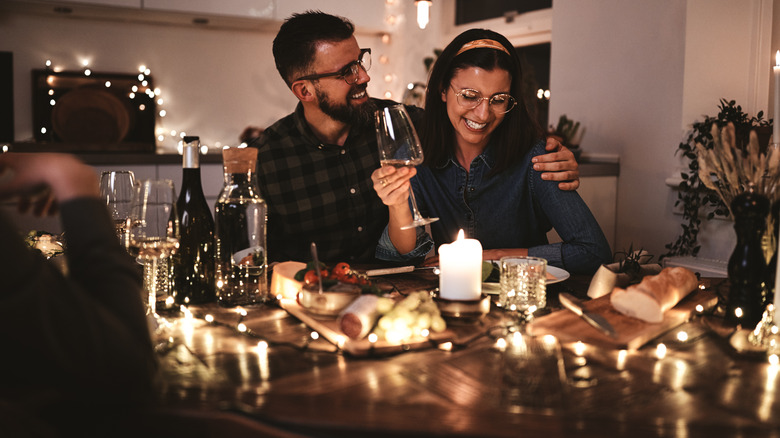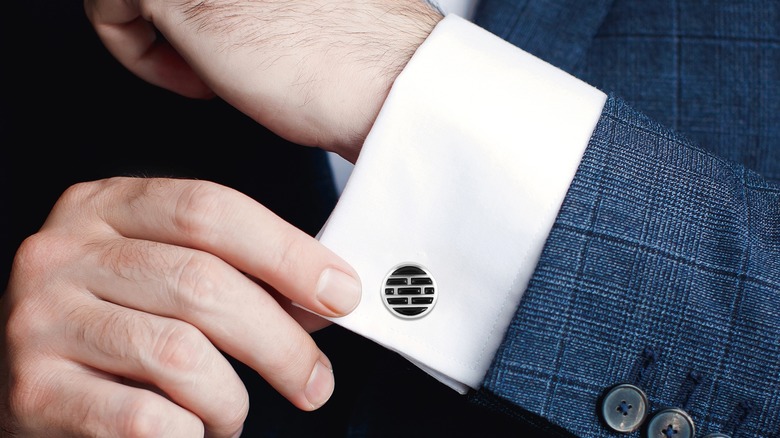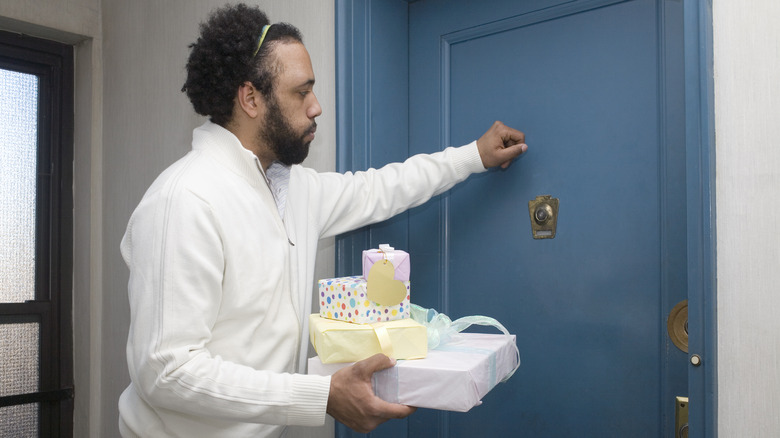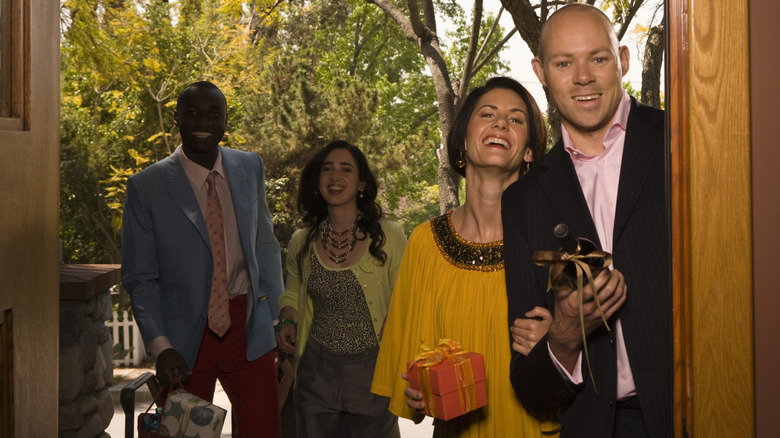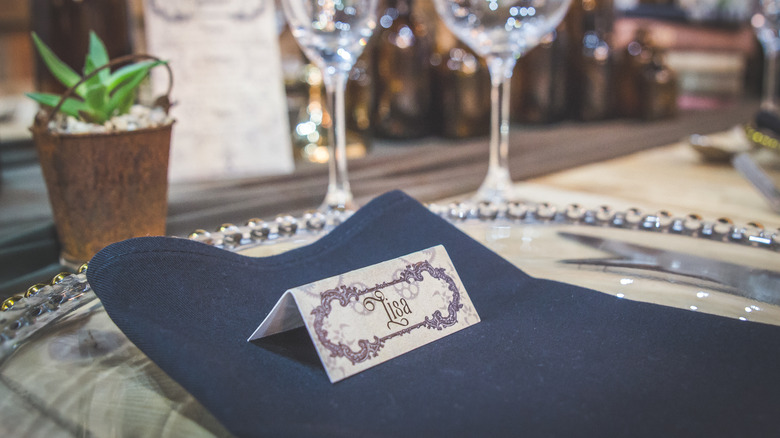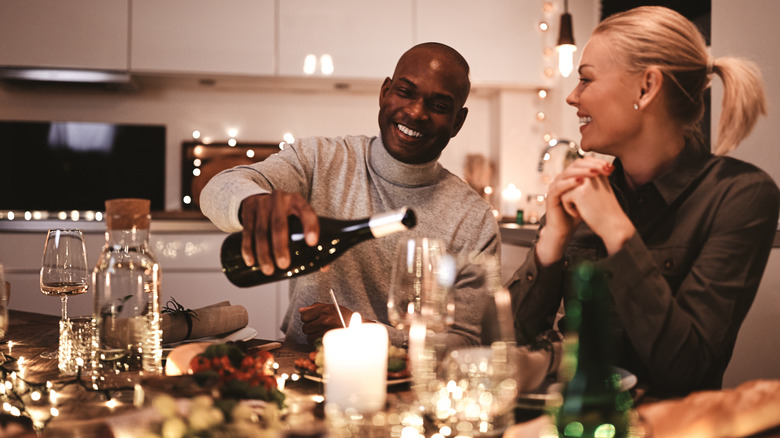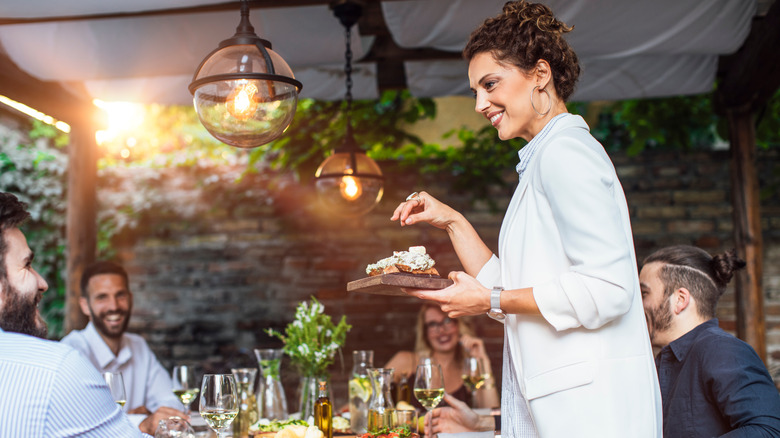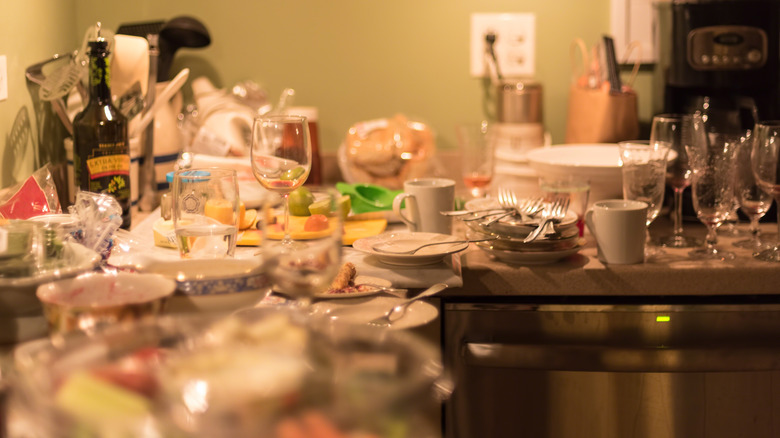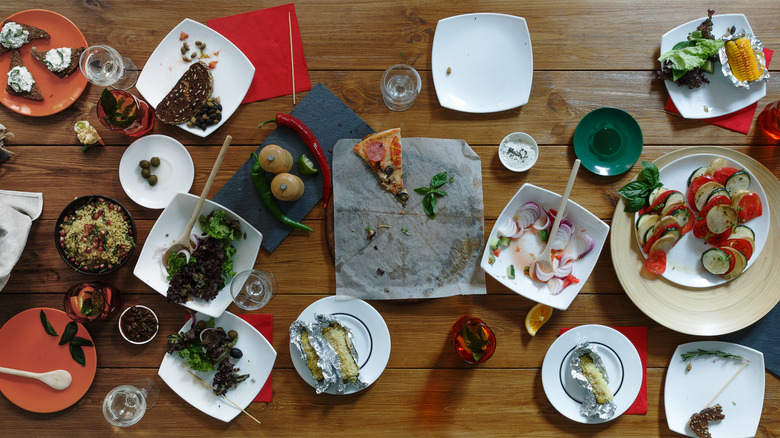Must-Know Tips For Being A Great Dinner Party Guest
From gourmet gatherings to festive feasts with family and friends, there's no end to the delights of a dinner party. What better way to spend an evening than sitting with a glass of wine while you're served homemade dishes as a welcome guest? However, if you think all you have to do is rock up and be waited on, you're mistaken. There are social mores and etiquette rules that you're expected to know and act accordingly.
From the minute you accept an invitation to the moment you bid farewell at the end of the night, there's a lot to consider if you want to be a great dinner party guest. This means there are plenty of pitfalls when it comes to acceptable politeness and how you interact with others. It's good to be aware of a few guidelines, like when to arrive and leave, what to bring, and how to behave, to help you feel less anxious about following the right protocol.
Being naturally considerate and listening to your intuitive sense is just as important, as you want your host, other guests, and yourself to feel at ease. The bonus about being a great dinner party guest is that you're more likely to be invited to another meal in the future — where you'll be able to keep practicing these tips.
Dressing for the occasion
Modern-day dinner parties often involve going to a friend's place for a relaxed soiree rather than a formal Downton Abbey-style dining affair. So, while it may not be expected (or appropriate) to turn up donning a tux or a ballgown, throwing on baggy sweats and a t-shirt might be a little too lax. It's not necessarily about keeping up appearances, but making an effort simply shows respect to your host. Dressing up, even if it's fairly informal, adds a sense of occasion to a dining experience and makes you feel good. If you're a bit clueless about what to wear, there are plenty of dress code guidelines from experts.
According to Byrdie, white tie formal is the most suited-and-booted event of all, followed by black tie. Unless these dress codes are stated on an invitation, you can take it down a notch. Consider the purpose of the dinner party, the season, and whether the event is indoors or outside. A cocktail party may encourage a smart, dressy look, while you may want something a little more fun with a festive edge for a New Year's Eve party. If the event is themed, add a few elements even if you don't want to go all out with a fancy costume. Meanwhile, if your host invites you for a relaxed dinner, there's no need to dig out your formal attire. However, keep in mind that casual doesn't necessarily mean the same clothes you wear when you're home alone.
Arriving at the right time
You may have received an invitation for a wedding that requests you to arrive at a certain time for a ceremony or party that begins a little later. In effect, this is directing you to turn up a little bit before proceedings begin so you're in place and ready on time. So, should you do the same for a dinner party? The resounding answer is no.
Have you ever arrived at a dinner someone's hosting one minute past the starting time and found everyone tucking into their appetizers? Probably not, as food is usually served once everyone's arrived, had time to catch up, and possibly enjoyed an aperitif and even a canape. Even when you knock on the door right on time, you may be greeted with a flurry of activity as your host welcomes you with a flustered air, wishing you'd turned up a little later. That's because arriving on time may not be the right time. So, what is?
Gabrielle Garcy who runs the napkin ring company GERI GABI reveals her rule on TikTok. She suggests turning up 10 to 15 minutes later than the invitation time. This way, you're not so late that everyone's waiting around and the food's getting cold. But you're also giving the host some extra time so they can make sure everything's ready and in place. That way, when they do come to greet you at the door, they're all set and the dinner party can properly begin.
Bringing a bottle or two of wine
Even if you're not that socially aware, most people know that it's typically expected for dinner party guests to bring wine. The natural follow-up questions are how many bottles and how much should you spend? To avoid feeling awkward that you've made a social faux pas, it's helpful to get this right so that everyone feels happy. You don't want to turn up with a case of wine if your host is planning a simple, civilized dinner, but is one bottle too little if you're going to be enjoying a lavish feast?
According to VinePair, the general rule is to bring at least a bottle per guest, which means couples should turn up armed with two bottles minimum. It's also worth considering your own wine-drinking habits. If you like your vino to flow and are a solo guest, then you may want to come bearing a bottle in each hand.
Keep in mind that the wine you bring is not necessarily meant for the table. Yes, your host may open it, but they may also keep it for another occasion and serve the bottles they had planned. Spending between $10 and $20 per bottle is acceptable unless the occasion warrants something higher-end. Also, bringing a bottle of wine for your host and another gift such as flowers is absolutely fine if you are attending as a couple and don't drink much.
Bringing gifts other than just wine
The New York Post reveals a trend that TikTok user @hana.elson has termed "damp lifestyle," which basically means drinking alcohol in moderation. Along with this comes the recognition that there isn't an expectation to drink on every occasion. With this in mind, you may find that a dinner party invite doesn't necessarily come with an invitation to drink your host under the table or have an evening of excess.
If the host isn't drinking wine for whatever reason, then it's probably best to check if it's a dry night before turning up with a bag clinking with bottles of cabernet for yourself and other guests. If it's fine to uncork a bottle or two but your host won't be raising a glass too, consider bringing a bottle of something non-alcoholic along with your bottle of wine (via VinePair).
Another great idea is to buy your host a small gift instead. Financial expert and author Julien Saunders suggests offering a gift voucher so they can enjoy a dinner without sweating away in the kitchen, or perhaps a cooking gadget if they like being culinary whizzes (via Yahoo! Finance). If your host insists you don't get them anything, then an invitation to a dinner you're cooking is a lovely way to show your gratitude for all their efforts. It really is the thought that counts.
Being asked to only bring yourself
It's such a treat to be invited over for a dinner party. It shows that somebody values and enjoys your company enough to cook you a lovely meal and spend time together. If the host is a great friend then they may beckon you to turn up as you are, without any wine or gifts. It's a phrase that you've no doubt heard along with a dinner invitation.
But is it okay to take your host at their word? With inflation rising, groceries and therefore the cost of a dinner party is also going up. As a guest, you might feel obliged to contribute in some way. According to a TikTok post by @kokobeaute, arriving with empty hands shows a lack of class. It doesn't have to be complicated — flowers, dessert, or wine are all acceptable.
Feed My Friends blog notes that you can show up without anything if your hosts are family and friends. Just be sure to help them out throughout the evening so that everything runs smoothly and they can relax. If you don't know your hosts that well or you're attending a work event, then your empty hands may be frowned upon. As for what to avoid, don't bring unexpected dishes to serve at the dinner, as well as any other food that will clutter your host's refrigerator.
Sitting at the right table setting
To enjoy any social situation it's best to be as relaxed as possible, rather than wracked with anxiety about making a mistake and offending anyone. Standing on ceremony can make not only you but also other guests and your host feel awkward and uncomfortable. There's a mindful balance between being totally laid back and showing consideration.
For example, while you may have a favorite chair or a set place at your own table, what about at a dinner party? Don't just take a seat at the head of the table or grab a chair far away from another guest who you don't want to get stuck beside — your host may have other ideas.
In a TikTok post, certified etiquette trainer Suzy Lins suggests that a polite guest should ask the host where to sit. The person organizing the evening may have particular ideas about the seating arrangement, which may include reserving a specific place at the table for a special guest. If it's someone's birthday, then you really don't want the embarrassment of being asked to move out of the guest of honor's seat.
Making conversation during dinner
While there are a rare few that enjoy a long silence in company, chances are that awkward lulls in conversation are not your thing. Typically, the hope is to take part in witty banter with your host and other guests. It's good to feel comfortable enough to share your own thoughts, but you'll be a better guest if you pay attention to your fellow dinner companions. If you're a little shy or socially anxious, then you may worry about breaking the ice and having interesting topics to talk about.
If you don't know a fellow guest, introduce yourself and go with the flow rather than planning out a whole spiel. If you don't feel a particular connection, then stick to simple subjects such as the food you're enjoying. Plus, since you've been invited to the same event, ask them about their relationship with your mutual host. A dinner party is a perfect opportunity to get to know people better, so make sure you think before you speak and respond to reactions.
Keep in mind that one of the biggest conversational mistakes to make as a dinner guest is gabbing away too much, according to a feature by Etiquette Scholar. Remember, listening is often more valuable than talking. Be yourself, and your sincerity will do the charming.
Avoiding certain conversation topics
Whether it's because you're a born conversationalist or because you're desperately seeking subjects to talk about over dinner, it's best to avoid some areas of discussion. Even if you know everyone around the table and feel comfortable with them, there are certain conversations that just aren't conducive to a pleasant evening of food and good times. That's not to say that you have to keep chats superficial, but be careful before you plunge headlong into deeply personal and controversial issues over dessert.
Per an article in Fashion Wallpaper, conversational topics to avoid include money, sex, and any embarrassing anecdotes about the host or other guests. Politics can be a great divider and an impassioned debate may be a bit of a buzzkill, causing some individuals to lock horns as temperatures rise and arguments ensue. Unless you know all of the attendees have a very open sense of humor, offensive jokes are off the table too. Meanwhile, nobody wants an in-depth report of ailments; stories that might put someone off their food or make guests feel squeamish are best edited out of the dinner table conversation.
There's certainly a robust argument for challenging the old adage of not discussing religion or politics at the table, as it can lead to empathy and a better understanding of others. However, perhaps a fun festive dinner party isn't the right occasion.
Drinking a sensible amount of alcohol
Over a whole evening, it's easy to bid your farewells with a fair amount of wine and assorted drinks under your belt. If you're attending a festive dinner party, the evening might start off with an amuse-bouche and aperitif cocktail. With wines flowing throughout the meal, you may even be offered a dessert wine after the final course. And then there's a digestif such as a fine brandy with coffee and chocolates or perhaps a Port with a slice of Stilton. If you're a fast drinker or can't hold your liquor that well, you may find that by the time espressos are served, you're a little more than merry.
To avoid becoming the classic dinner party drunken buffoon, TikTok account @barchemistry suggests setting yourself some limits. For starters, promise yourself that you'll avoid any shots. While a tequila slammer may get the party started, it could also end up with you acting as if you're at an all-night rave rather than at dinner. Make a concerted effort to drink more slowly. If you're the fastest at necking wine then it may not end well for you, and consequently for everyone around you. Be sure to mix drinks with club soda so you stay hydrated and follow the golden rule to drink a glass of water after every alcoholic one.
Keeping gadgets off the table
Do you remember when nobody had smartphones? What about when people didn't jump up and take a call or immediately reply to a message or email during a social occasion? Whether or not you do, it's important not to lose the art of conversation and miss out on the joy of convivial company because you're checking social media or still in work mode. Nobody's asking you to pretend it's the '90s, but while you may be digitally attached in your daily life, give it a break during a dinner party. The general rule is to dine unplugged and leave gadgets off the table, according to Candace Smith Etiquette.
That being said, there are circumstances when you can bypass these guidelines, as long as you're still being polite. If you really can't avoid a call, then warn your host ahead of time and make sure to set your phone to a vibrating alert rather than blasting everyone with your ringtone. A simple apology as you take your call away from the table will avoid disrupting the dinner for others. This doesn't mean that you should keep your phone in view next to your cutlery, so be discreet.
Of course, nowadays it's common for Google to become an extra guest at the table. If you're having a fun time chatting about different subjects and everyone wants to check a fact or detail that helps the conversational flow, we've become accustomed to knowing the answer on the spot.
Complimenting the host on the food
Most people, even those with only a modicum of table manners, understand that if someone goes to the effort of making you dinner then it's polite to say thanks. Beyond gratitude, you may even offer some comments to compliment the chef. While you might imagine that showering your host with praise over their culinary creations is hard to mess up, according to Eating Well, that's not always the case. Unfortunately, even the most well-intentioned comments can backfire.
First off, avoid badgering someone to reveal a family or secret recipe, and instead simply show interest in the dish. If the host has concocted something ambitious or decidedly different, then steer clear of offending them with backhanded compliments. While you might be surprised the unique-looking creation is actually tasty, you probably should hide your shock. Similarly, avoid describing a dish with certain adjectives (interesting is a common culprit) or making suggestions on how the host could improve or change it.
Rather than analyzing all the ingredients and questioning the nutritional content, if you're on a health kick or have certain dietary requirements then simply let the host know in advance. Per the etiquette consulting firm Manners Simply, you should at least try what is served to show your willingness to the host, unless you have a specific allergy (via Chicago Tribune). If there's something you're less fond of, detract attention from what you leave behind by eating up the food you do like.
Offering to clean up or not
The food's been polished off and everyone's sitting back content and full. The host stands to clear away the dishes. What do you do? What are you supposed to do? Should you offer to clean up after a dinner party? As with many rules on dining etiquette, the answer may depend on whether you're at a formal affair or chowing down with family or close friends.
The host might have additional considerations, such as whether they plan to simply remove the plates from the table or start to wash and clear them up properly. A good rule of thumb is to offer to help and follow your instinct. A formal dinner is quite different from a festive feast with everyone mucking in. If you do help, then tossing scraps in the garbage and putting plates in the dishwasher is fine, but don't start rooting in the fridge or closed cupboards (via She Knows).
Apartment Therapy highlights advice from etiquette expert Nick Leighton, who suggests not pushing it if a host refuses your offer to help. They may have reasons for not wanting help aside from just being polite. If it's a holiday dinner party, such as Thanksgiving or New Year's Eve, they may want to deal with their best dinnerware alone, without the risk of a guest dropping a cherished plate.
Leaving at the right time
The candles are flickering and the room is filled with the sounds of a successful dinner party. With food, wine, and great people, time can fly by. However, you don't want to outstay your welcome and only realize the party's over when the host not-so-subtly hands you your coat or suggests calling you a cab. The shame! On the other hand, you may want to get going, perhaps because the babysitter's waiting (and expensive!) or you've just had your fill, but worry that leaving too early will offend. When to leave depends on various factors, and being able to read a room and respond to cues comes into play. Thankfully, there are guidelines to assist as well.
Columnist Thomas Blaikie suggests choosing a specific time to leave before the night starts, and slightly adjusting so that it feels organic at the moment (via Apartment Therapy). This makes sense as a sudden exit may come across as abrupt and affect the ambience around the table. However, it's good to set a time for yourself — Blaikie advises leaving before 11:15 p.m. on weekends and some 45 minutes earlier on weeknights. Of course, this isn't a hard and fast rule. If it's New Year's Eve, it may seem churlish to rush out the door before the chimes. However, lingering over coffee may overstretch the night. While you want to relax and enjoy yourself, you don't want it to appear as if you're about to stay the night.
Taking leftovers home or not
Have you ever eaten a meal that was so delicious that you feel as if you could eat it all again? If you're the host with the most and you have leftovers, then you can do just that the next day. But what about if you're the guest, should you take food home with you from a dinner party? It depends on the occasion, but Southern Living reports that in most cases, it's generally accepted that you skip the doggie bag.
If you know your host well and they encourage you to take home some food, then there's no use going back and forth to go against what they're suggesting. They genuinely might want to get rid of a dish for whatever reason. It could be that you've contributed to the dinner party, and the relaxed vibe suggests it's cool to go home with a dish or two. However, if you sense that taking it would be depriving your host of a handy meal for them to enjoy over the coming days, then it's best to decline. Of course, if you're being handed back what you brought then it's fine to take it; perhaps your host wasn't fond of it or maybe their fridge is simply too full.
